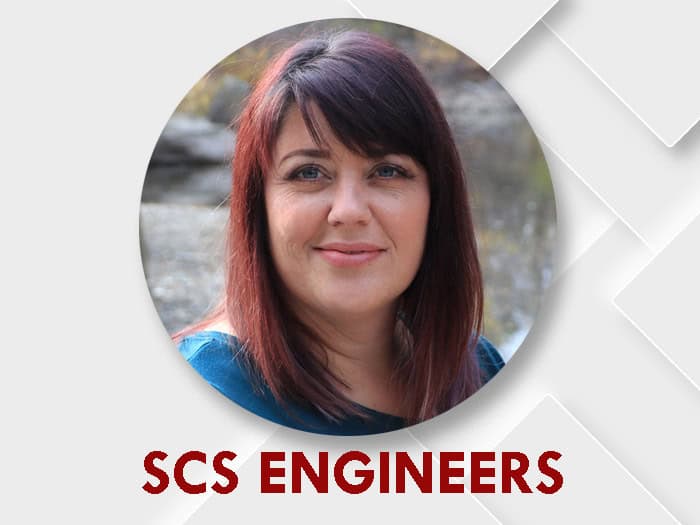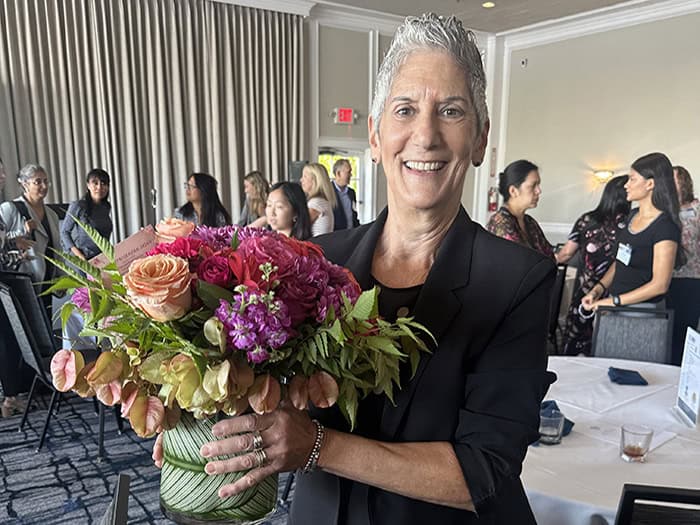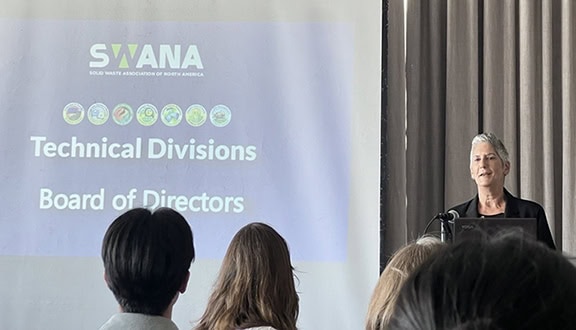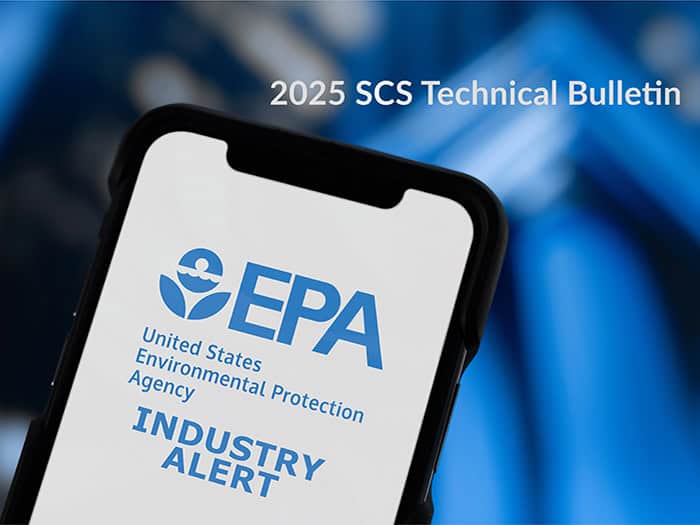


Michelle Langdon, PE, joins SCS Engineers to serve solid waste clients nationwide as Waste Management Project Director. Michelle works from Boise, ID, and brings to SCS her impressive expertise, qualifications, and success record.
Michelle Langdon is a licensed Professional Engineer in multiple states with a comprehensive work history emphasizing leadership in engineering projects related to waste management systems. She has over two decades of experience leading full-service, multidisciplinary teams across planning, design, construction, operations, and permitting. As a consultant, Michelle brings her years of experience working for a county waste management division to her work, helping her understand project challenges from her clients’ perspectives.
Her background includes designing and managing multiple projects to develop sustainable, efficient waste management systems that optimize operations, create safer work environments, reduce methane emissions, capture waste materials for beneficial reuse, and protect the environment.
Michelle says, ”After a lot of research and meeting with different firms, I knew SCS was the right place for me. I knew they were an industry leader with a deep breadth of technical expertise, but it is their focus on client service and employee welfare that drew me in.”
SWANA (the Solid Waste Association of North America) honored Michelle with the 2025 prestigious Professional Achievement Award for her work directing engineering efforts on complex and diverse solid waste projects, landfill expansions, coal combustion residuals, transfer station designs, master planning, and operations assessments. Along with managing multimillion-dollar civil and environmental engineering projects for landfills, composting facilities, recycling centers, and transfer stations, she oversees all phases of work from conceptual design and permitting through construction, and quality assurance/quality control (QA/QC). Her passion lies in sharing her knowledge with the waste industry and young professionals through teaching, presenting, and mentoring, and she has been fortunate to do so across the nation.
SCS Vice President Greg Helland says: In addition to Michelle’s successful record of accomplishments for her clients, she is a skilled presenter, trainer, and mentor. A great fit with our SCS culture. She regularly shares her comprehensive knowledge with our industry through training and leadership positions. As a natural leader, we believe Michelle builds trust, fosters collaboration, and empowers others to see the bigger picture for sustainable results.
Additional Qualifications
Join SCS Engineers and John Tsun as he serves as one of the co-organizers for the 24th Annual Joint Venture NJDEP/Air & Waste Management Association (A&WMA) Regulatory Update Conference, November 21st.
 This one-day virtual event provides attendees with the latest updates on New Jersey Department of Environmental Protection (NJDEP) regulatory initiatives and programs related to environmental compliance, air quality, contaminated site remediation and redevelopment, energy, materials sustainability, water quality, and climate change mitigation.
This one-day virtual event provides attendees with the latest updates on New Jersey Department of Environmental Protection (NJDEP) regulatory initiatives and programs related to environmental compliance, air quality, contaminated site remediation and redevelopment, energy, materials sustainability, water quality, and climate change mitigation.
The conference offers a valuable opportunity for environmental professionals, regulators, and industry leaders to engage directly with NJDEP representatives and stay informed on emerging policies, research, and best practices shaping the future of sustainable environmental management. Register now.
Join SCS Engineers Vice President James Law on November 12th as a featured speaker at COP30, joining Zero Waste Europe (ZWE) and global leaders to discuss innovative strategies for reducing methane emissions in the waste sector.
 James will speak during the session “MRBT – Fast Track Climate Solution for Residual Waste: Shifting from Post-Landfill Capture to Pre-Landfill Methane Prevention” on Wednesday, November 12, 2025, from 3:30–5:00 p.m. in the Nordic Pavilion.
James will speak during the session “MRBT – Fast Track Climate Solution for Residual Waste: Shifting from Post-Landfill Capture to Pre-Landfill Methane Prevention” on Wednesday, November 12, 2025, from 3:30–5:00 p.m. in the Nordic Pavilion.
This event will highlight how Material Recovery and Biological Treatment (MRBT) offers a scalable pathway to cut methane emissions, recover valuable resources, and advance circular economy goals. By focusing on pre-landfill methane prevention, the session underscores how early waste treatment can support climate-neutral systems and accelerate progress toward the Paris Agreement targets.
We’re proud to have James representing SCS Engineers on the global stage, contributing his expertise to help shape sustainable, low-carbon waste management solutions worldwide.
Join SCS Engineers, sponsors and exhibitors at COMPOST 2026, February 2-5th at the SAFE Credit Union Convention Center in Sacramento, California. Compost 2026 is the world’s largest composting event. The U.S Composting Council’s Annual Conference and Tradeshow is the premiere professional meeting for composting, organics recycling, and related topics. USCC provides training, demonstrations, and the opportunity to engage with member organizations, industry leaders such as SCS, investors, advocates, and partners. We look forward to seeing you there. Register now!

Soil health is a cornerstone of sustainable agriculture, and the USDA’s Natural Resources Conservation Service is taking steps to support it through Conservation Practice Standard Code 336. This initiative, part of the Environmental Quality Incentives Program (EQIP), offers financial incentives to land managers who apply soil carbon amendments, such as compost, biochar, and blended materials, to improve soil quality and sequester carbon. For compost and biochar producers, this program could be a significant driver of demand for compost and biochar products that meet USDA standards for soil carbon amendments.
Why Soil Carbon Amendments Matter
The USDA’s Code 336 program enhances soil organic matter, increases carbon sequestration and soil carbon stocks, improves soil aggregate stability, and supports healthy soil ecosystems. These benefits contribute to long-term agricultural productivity and align with broader climate resilience goals.
Reimbursement Rates and Financial Incentives
Reimbursement rates vary by state and are higher for historically underserved (HU) land managers. EQIP covers the cost of purchasing, transporting, and applying soil carbon amendments. For example, in Massachusetts, reimbursement for 100% biochar is $211.37 per cubic yard, while HU land managers receive $253.64. Blended compost/biochar options and small-area applications are also eligible, with rates adjusted accordingly.
Here’s a snapshot of some Massachusetts EQIP rates:
| Component |
Unit |
Standard Rate |
HU Rate |
| 100% Biochar | CuYd |
$211.37 |
$253.64 |
| 20% Biochar / 80% Compost | CuYd |
$105.91 |
$127.09 |
| Compost Off-site by Volume | CuYd |
70.02 |
84.02 |
Eligible Land Types in USDA EQIP Code 336
The program applies to a wide range of land uses, including:
Landowners are responsible for planning and implementing the amendment applications, including securing necessary permits. EQIP may also reimburse planning and testing costs, provided the soil at the proposed site is evaluated and found to need amendment.
Standards for Compost and Biochar in USDA EQIP Code 336
To qualify for reimbursement, amendments must meet specific criteria, including:
Compost Requirements
Biochar Requirements
Conclusions About USDA EQIP Code 336
The USDA’s EQIP Code 336 program offers a valuable opportunity for land managers to enhance soil health while receiving financial support. By encouraging the use of compost and biochar, the program promotes sustainable agriculture and helps build a robust market for carbon-based soil amendments.
For compost and biochar producers, this program could be a significant driver of demand for products and support environmentally beneficial practices across many land uses.
Additional Resources:

On Thursday, September 25, at the Southern California SWANA Annual Meeting and Workshop, Michelle Leonard completed her 18-year tenure as a member of the Southern California Founding Chapter Board of Directors, and most recently as Chapter President. Her departure marks the end of an era defined by visionary leadership, advocacy, and transformative impact in the solid waste management industry.
Michelle’s journey with SWANA began in the early 1990s, when she joined SCS Engineers and quickly became a trailblazer in a field where women were few and far between. Over the years, she rose through the ranks of SWANA’s Executive Board, serving as Treasurer, Secretary, Vice President, and ultimately President in 2015. Her commitment to education, mentorship, and innovation has left an indelible mark on the organization and the broader environmental community.

At the September 25 workshop held at The Reef in Long Beach, Michelle opened the day with a warm welcome and presided over the annual business meeting, which included board slate approvals and by-law updates. Later in the day, she delivered a deeply personal and inspiring keynote titled “If I Knew Then What I Know Now: My Journey in SWANA and the World of Waste”—a reflection on her career, the evolution of the industry, and the lessons learned along the way.
As Senior Vice President at SCS Engineers, she has led dozens of high-impact projects across California and beyond. Her expertise spans solid waste management planning, recycling program design, regulatory compliance, and sustainable materials management. She has worked with municipalities, tribal governments, and regional authorities to develop innovative solutions that reduce, reuse, and recycle waste while improving operational efficiency.
Her leadership has also extended to national platforms. Michelle is a past recipient of SWANA’s Sustainable Materials Management Technical Division Distinguished Achievement Award and Waste 360’s inaugural Women Who Inspire Award. She is known for her ability to moderate panels, present at conferences, and mentor the next generation of environmental professionals.
As Michelle steps down from her role on the SWANA SoCal Board, her legacy continues through the programs she helped build, the people she inspired, and the standards she set. Her swan song may mark the end of her board position, but it is far from the end of her influence as she continues supporting SCS Engineers clients.
Say hello to Michelle on LinkedIn or from the SCS website!
Join SCS Engineers at AEC PM Connect 2025 – Kansas City, October 27-28 at Keen Wealth Advisors in Overland Park, KS. This event focuses on project management in the Architecture, Engineering, and Construction industry.
 On Tuesday, October 28 at 10:45 a.m., Jenny Taylor will join the panel “Ask Me Anything About Project Management”, sharing insights alongside other AEC leaders to help project managers strengthen their strategies, lead effectively, and drive successful outcomes within their organizations.
On Tuesday, October 28 at 10:45 a.m., Jenny Taylor will join the panel “Ask Me Anything About Project Management”, sharing insights alongside other AEC leaders to help project managers strengthen their strategies, lead effectively, and drive successful outcomes within their organizations.
AEC PM Connect – Kansas City offers two tailored learning tracks for project managers and those responsible for their development, covering essential topics like risk management, scope creep, earned value, PM tools, and strategies for building a strong project management culture.
We’re proud to have Jenny representing SCS at this impactful event and look forward to connecting with industry peers in Kansas City! Register Today

On September 17, 2025, the U.S. Environmental Protection Agency (EPA) announced the next steps regarding regulatory efforts to address the cleanup of perfluorooctanoic acid (PFOA) and perfluorooctanesulfonic acid (PFOS). In the press release, EPA Administrator Zeldin said, “…we will need new statutory language from Congress to fully address our concerns with passive receiver liability.”
CERCLA imposes broad, retroactive, and potentially costly strict liability on those who release hazardous substances to the environment. This liability can sometimes attach to entities that did not manufacture or generate the substance but received it in feedstocks, products, or landfilled waste. The EPA refers to these entities as “passive receivers.” Members of Congress received testimony and input from various industries, including private and municipal landfills, and passed it to the EPA, which intends to continue working with Congress. No workshops or additional input forums were announced.
The major concern for passive PFOA and PFOS contamination receivers, including local municipalities and service providers, is potentially passing decontamination costs onto ratepayers, taxpayers, and consumers. EPA will continue to collect information on its costs and benefits, but feels the best solution to this issue is a statutory fix to protect passive receivers from liability.
For now, EPA is retaining the Comprehensive Environmental Response, Compensation, and Liability Act (CERCLA or Superfund) hazardous substance designation for PFOA and PFOS and will initiate future rulemaking to establish a uniform framework governing the designation of hazardous substances under section 102(a) of CERCLA moving forward. The current rule mandates reporting of releases of one pound or more of PFOA or PFOS within 24 hours. It designates Perfluorooctanoic Acid (PFOA) and Perfluorooctane sulfonic Acid (PFOS) as CERCLA hazardous substances. See 42 U.S.C §9602; Docket EPA-HQ-OLEM-2019-0341.
According to the EPA, a CERCLA section 102(a) Framework Rule would provide a uniform approach to guide future hazardous substance designations, including how the agency will consider the costs of proposed designations. Section 102(a) gives the EPA authority to designate additional hazardous substances beyond those listed under the other statutes referenced in CERCLA (the Clean Water Act, the Clean Air Act, the Resource Conservation and Recovery Act, and the Toxic Substances Control Act). Once finalized, the 102(a) Framework Rule would provide a uniform approach for future designations.
In response to the EPA’s August 26, 2022, proposed rule to list PFOA and PFOS as CERCLA hazardous substances, numerous comments were submitted requesting that the final CERCLA HS rule include exemptions or similar liability relief for passive receivers that did not generate the chemicals – e.g., landfills, wastewater treatment facilities, and water supply systems.
Background
EPA’s May 8, 2024, final CERCLA HS rule did not provide an exemption. However, EPA’s April 19, 2024, Memorandum entitled “PFAS Enforcement Discretion and Settlement Policy Under CERCLA” outlines enforcement discretion considerations for the following entities:
(1) Community water systems and publicly owned treatment works (POTWs)
(2) Municipal separate storm sewer systems (MS4s);
(3) Publicly owned/operated municipal solid waste landfills;
(4) Publicly owned airports and local fire departments; and
(5) Farms where biosolids are applied to the land.
Despite the enforcement discretion policy, some passive receivers were disappointed that the agency did not provide stronger liability protection. Based on EPA’s September 2025 press release (above), EPA now plans to take a closer look at the issue, including the possibility of providing a statutory fix to protect passive receivers from liability.
If you have questions regarding this rule, please get in touch with SCS Engineers.
SCS Engineers is excited to join the NWTC Advanced Manufacturing & Engineering (STEM) Career Fair!
We look forward to meeting Northeast WI School of Innovation High School Seniors from 10:00 – 11:00 a.m., and connecting with all NWTC students between 11:15 a.m. – 1:00 p.m.
SCS Engineers provides innovative environmental consulting and engineering solutions in solid waste management, renewable energy, remediation, and sustainable infrastructure. Whether you’re exploring full-time roles, internships, part-time work, or networking opportunities, our team is eager to share how you can grow your career and make an impact with SCS.
SCS Engineers is proud to take part in Engineering Career Night at Messiah University.
This event provides students the opportunity to network with industry professionals, attend targeted workshops, and explore career paths across engineering disciplines. Join us in Brubaker Auditorium at the Eisenhower Campus Complex to connect with our team and learn more about internships, co-ops, and full-time roles with SCS Engineers.
At SCS, we combine engineering expertise with a passion for sustainability—delivering innovative solutions in solid waste management, renewable energy, remediation, and infrastructure. We look forward to meeting students who are ready to plan their careers and make an impact in their communities.